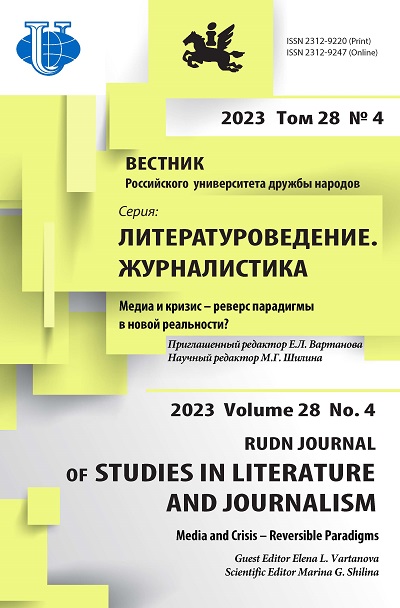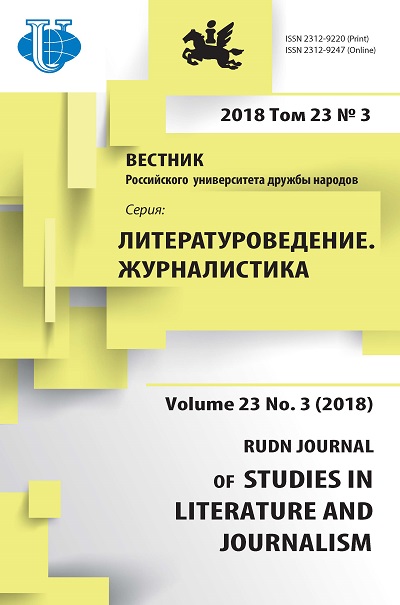TOP MANAGERS OF THE LEADING MEDIA OF RUSSIA: SOCIAL-DEMOGRAPHIC PORTRAIT OF THE COMMUNITY
- Authors: Sharikov A.V.1, Cherkasova M.V.1
-
Affiliations:
- National Research University Higher School of Economics
- Issue: Vol 23, No 3 (2018)
- Pages: 312-322
- Section: JOURNALISM
- URL: https://journals.rudn.ru/literary-criticism/article/view/19020
- DOI: https://doi.org/10.22363/2312-9220-2018-23-3-312-322
Cite item
Full Text
Abstract
The article presents the results of a special study of top-managers of Russian media. The authors’ goal is to compile their generalized socio-demographic portrait. The study was conducted in two stages. The result of the first stage was a validated list of four criteria, on the basis of which the surveyed top managers were selected - 50 people for different media segments (television, radio, press) who worked as heads of the leading Russian media enterprises in 2000-2015. At the second stage, the biographies of selected top managers were analyzed. The collected data was subjected to statistical processing (calculation of percentage and average values).
Keywords
About the authors
Alexander Vyacheslavovich Sharikov
National Research University Higher School of Economics
Author for correspondence.
Email: asharikov@hse.ru
Professor of the Media Department of the Communications, Media, and Design Department of the National Research University “Higher School of Economics”, the academic suprviser of the master program “Media Management”.
20, Myasnitskaya str., Moscow, 101000, Russian FederationMarina Vladimirovna Cherkasova
National Research University Higher School of Economics
Email: asharikov@hse.ru
Master of Media Communications, Producer of the International News Agency “Russia Segodnya”.
20, Myasnitskaya str., Moscow, 101000, Russian FederationReferences
- Advertising Agency Panel // Billboard. 1948. 7th August. P. 2.
- Hawley C.A. An Examination of Management / Communication Perceptions of Library Media Manager. Boston: Boston University, 1983.
- Manning B.K. Perceptions of the Media Manager’s Role in the High Technology Industry (audiovisual, industrial, higher education). Pittsburg: University of Pittsburg, 1985.
- Vartanova E.L. Chem upravlyayut menedzhery SMI? [What is Managed by Media Managers?]. Medioscope. 2007. № 1. URL: http://www.mediascope.ru (accessed: 17.06.2018).
- Gurevich S. Kadrovyj potentsial mediaindustrii v Rossii: priznaki krizisa [Personnel Potential of the Media Industry in Russia: Signs of Crisis]. MediaAlmanakh. 2008. № 1. Pp. 6—8.
- Demina I.N. Sistema upravleniya mediapredpriyatiyami v sovremennoj Rossii [Management system mediapiraten in modern Russia]. SPb.: S.-Peterb.gos. inzhener.-ehkon. un-t, 2007.
- Zinov’eva E.B. Izuchenie osobennostej formirovaniya lichnosti mediamenedzhera v usloviyakh izmeneniya vneshnej i vnutrennej sredy [Studying the Features of the Formation of the Personality of the Media Manager in Conditions of Changing the External and Internal Environment]. RGGU Bulletin. Series: History. Philology. Cultural Studies. Oriental Studies. 2016. № 4 (13). Pp. 105—113.
- Zinov’eva E.B. Samokontrol’ i vysokaya stressoustojchivost’ khoroshego mediamenedzhera. Professiogramma rukovoditelya tvorchesko-proizvodstvennogo televizionnogo kollektiva [Selfcontrol and High Stress-resistance of a Good Media Manager. Professionogram of the Head of the Creative and Production Television Collective]. Kadrovik. 2008. № 4-2. Pp. 20—25.
- Volkova I.I. Uchebnaya igra «Zhurnalist — menedzher»: texnologiya podgotovki i provedeniya [Training Game “Journalist-Manager”: Technology for Preparation and Conduct]. Vestnik RUDN. Seriya «Literaturovedenie. Zhurnalistika» [RUDN Journal of Studies in Literature and Journalism]. 2012. № 4. P. 134—140.
- Mapua J. A career as a social media manager. New York: Rosen Publishing, 2018.
- Roberts L. Careers in digital media. San Diego, CA: Reference Point Press Inc., 2017.
- Scott R. Human resource management in the electronic media. Westport, Conn.: Quorum Books, 1998.
- Story M. Starting your career as a social media manager New York: Allworth Press, 2012.
- Retter E. Manager im Kommunikationskraftfeld: die Wechselbeziehung zwischen Kommunikation und Kultur im Unternehmen unter Berücksichtigung psychologischer und kommunikativer Persönlichkeitsmerkmale. Frankfurt am Main ; New York: P. Lang, 1996.
- Global trends in freedom of expression and media development. Paris: UNESCO, 2017.
















